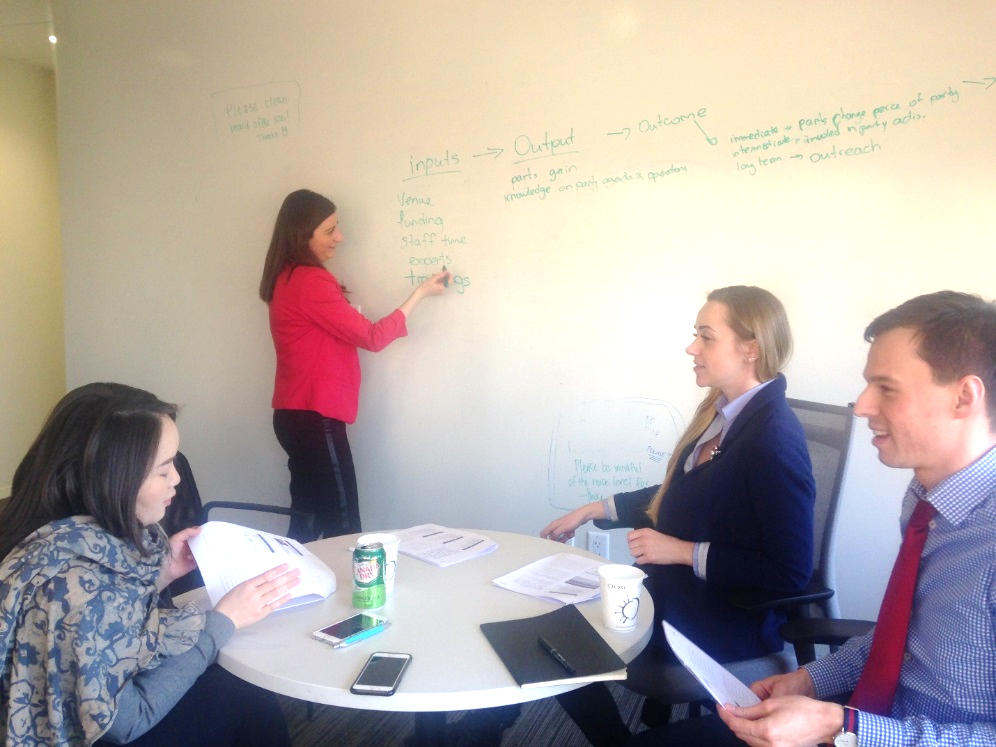
On February 28, 2016, after traveling for over 20 hours, I finally landed in Washington, DC from Ulaanbaatar, Mongolia as part of a three-day International Republican Institute’s (IRI) Monitoring & Evaluation (M&E) Scholars Conference with my counterparts in IRI’s field offices around the world.
(The M&E Scholars Conference is part of IRI’s M&E Scholars Program, which you can read more about in other blogs here, here and here.) Prior to the trip, I had expected the conference to be a series of lectures solely focused on honing our skills as evaluators of Democracy & Governance (D&G) initiatives IRI implements with the support of international funders and donors including the National Endowment for Democracy and the United States Agency for International Development.
However, the conference far exceeded my initial expectations from day one. Not only did I sharpen my knowledge and ability to develop and utilize M&E tools necessary to track and measure the impact of our efforts in Mongolia but I also learned:
- Amongst the widespread fascination with all things quantitative, such as randomized controlled trials (RCTs), qualitative evaluation methods allow IRI to capture the nuances of our D&G programs and leverage opportunities for further learning and innovation;
- Current trends in the international development field from both the funder’s and implementer’s perspectives offer a promising outlook for M&E practitioners;
- IRI’s field M&E staff often face similar challenges despite having diverse programs in vastly different cultural and political contexts.
Below I will share more detail related to each of these points.
Capturing Nuances
I had been interested in assessing impacts long before I joined IRI in Mongolia. This interest was further developed through my studies and internships at organizations like Innovations for Poverty Action. During that time, I and the rest of the development community, focused and advocated for the importance of measuring quantifiable changes to interventions and finding statistical significance. In that context, qualitative methods were not considered to be as strong. After becoming familiar with D&G programs through IRI and getting hands-on experience in actual program implementation, I learned to appreciate the benefits and more importantly, the necessity of qualitative approaches to evaluation. One component of the M&E Scholars conference provided us with real examples of IRI’s creative qualitative data collection techniques tailored to specific socio-cultural and political contexts and how such findings were used to inform programming that best fit the needs of the target groups. These examples increased my appreciation for our approach to evaluations and clarified that the personal aspects of qualitative methods, such as focus-group discussions with key stakeholders and one-on-one interviews with program beneficiaries, enable us to capture things that cannot be measured in numbers alone. For me, to implement and to evaluate D&G programs is to be adaptable and to understand these nuances and how these multifaceted factors can influence outcomes of any intervention.
Future of an M&E Practitioner
In one of the afternoon panel discussion sessions, we had an opportunity to hear and discuss funders’ views on M&E. In addition to monitoring and evaluation, the panelists highlighted the increased efforts of funder organizations to focus on LEARNING. The learning part meant that M&E was not merely a reporting requirement but an integral aspect of program implementation that require both those in charge of implementation and M&E to work in unison to tackle challenges and adjust our approaches to achieve greater impact. Aside from this panel discussion, the notions of learning, adaptation, collaboration and innovation echoed all throughout the three-day conference from IRI leadership and DC staff. With our supportive and cooperative team in the Mongolia field office, we already see M&E through this learning lens, however, to have these reiterated and valued by funders and IRI DC staff made me excited for the bright future of M&E.
Amongst My Peers
Our schedules for the conference were also full of insightful peer-to-peer learning and sharing opportunities, not only with IRI’s M&E team in DC, but with other scholars, from IRI’s offices all around the world, whose interests and responsibilities are similar to mine. It was fascinating to learn about different IRI initiatives and what it means to develop culturally-sensitive programs. For example, one of my peers shared with me how her office utilized story-telling methods in a country with a strong oral tradition to carry out voter education activities. On the other hand, we all discussed practical challenges of being “the M&E person” in the office and shared anecdotes of how a pleasant personality can go a long way in getting your co-workers’ buy-in to turn their report in on time! Being a part of this diverse group of people, I truly realized how global IRI’s reach is and how lucky I was to be able to participate in the conference and learn and laugh with them during my visit to DC.
Bringing It All Back
Now that I’m back in Mongolia, I am eager to put my learning and momentum from the conference to effective use in our programs to support the inclusivity of Mongolia’s upcoming 2016 elections and to foster transparent and accountable municipal government in the capital city of Ulaanbaatar. I also hope to share and demonstrate the benefits of M&E with our local partners, both government and civil society, as well as our beneficiaries along the way. If all stakeholders, especially elected officials and public institutions that are answerable to the people, come to demand efficacy, innovation and accountability in their work (which are all direct benefits of M&E), then there’s a greater opportunity for strengthened democracy and governance.
Top